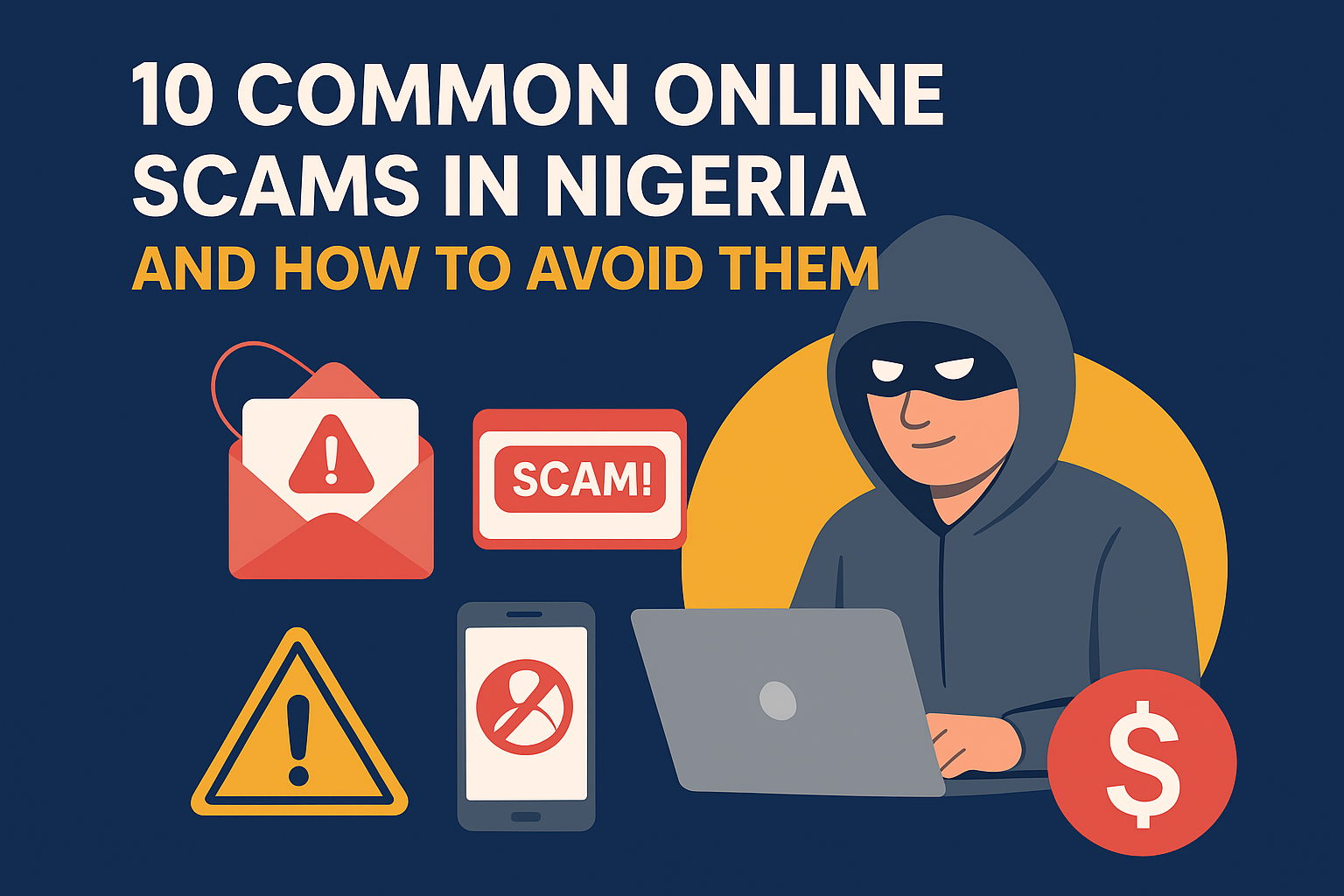10 Common Online Scams in Nigeria and How to Avoid Them (2025 Guide)
Introduction
Nigeria has one of the fastest-growing internet user bases in Africa. With this growth comes both opportunities and risks—especially the rise of online scams. Fraudsters constantly develop new tricks to deceive people, ranging from fake investment schemes to impersonation scams.
If you use mobile banking apps, social media, or online shopping platforms, you must be extra vigilant. In this guide, we’ll highlight the 10 most common online scams in Nigeria and share practical tips to avoid them.
1. Phishing Scams
Phishing is one of the most widespread online scams in Nigeria. Fraudsters send fake emails, SMS, or WhatsApp messages pretending to be banks, delivery companies, or government agencies.
Example: “Your bank account has been suspended. Click this link to reactivate.”
How to Avoid It
- Never click on suspicious links in emails or SMS.
- Verify messages by calling your bank directly.
- Check URLs carefully—fraudsters often use look-alike websites.
2. Fake Online Investment Platforms
With the rise of fintech and crypto in Nigeria, fraudsters create fake investment websites promising outrageous returns (e.g., “Get 50% profit in 7 days”).
How to Avoid It
- Research any investment company before putting in money.
- Avoid platforms promising “guaranteed profits.”
- Stick to licensed investment firms regulated by the SEC (Securities and Exchange Commission).
3. Social Media Impersonation Scams
Fraudsters clone Facebook, Instagram, or WhatsApp accounts of celebrities, businesspeople, or even your close friends. They then request money for “urgent issues” or offer fake job opportunities.
How to Avoid It
- Always confirm with the real person through a direct call.
- Avoid sending money based on social media requests.
- Check account activity—new accounts with few followers are suspicious.
Read also: Top Cybersecurity Threats Facing Nigerian Businesses in 2025
4. Online Shopping Fraud
Fake e-commerce websites or Instagram vendors promise cheap deals, but once you pay, they disappear without delivering the goods.
How to Avoid It
- Only buy from trusted platforms like Jumia, Konga, or verified Instagram shops.
- Look for reviews and testimonials before paying.
- Use “Pay on Delivery” whenever possible.
5. Lottery & Giveaway Scams
You may receive emails or messages claiming you’ve won a lottery, foreign prize, or celebrity giveaway. But before you claim it, they’ll ask you to “pay processing fees.”
How to Avoid It
- Remember: Legitimate giveaways never ask you to pay money first.
- Ignore lottery messages from unknown sources.
- Verify giveaways directly from official celebrity pages.
6. Romance & Dating Scams
With online dating apps and social platforms, scammers often pretend to fall in love, build trust, and then request money for emergencies (such as medical bills or travel expenses).
How to Avoid It
- Be cautious of relationships that move too fast online.
- Never send money to someone you haven’t met in person.
- Watch out for excuses when they avoid video calls or face-to-face meetings.
Read also: How to Secure Your Nigerian Bank Apps from Hackers in 2025 (Complete Guide)
7. Job Recruitment Scams
Many Nigerians fall victim to fake job offers requiring “registration fees,” “medical tests,” or “training costs” before employment.
How to Avoid It
- Real employers do not ask applicants for money.
- Research the company before applying.
- Verify job offers on official company websites.
8. Business Email Compromise (BEC)
Scammers hack into company emails and send fake invoices or payment requests to employees and clients. This has cost Nigerian businesses billions of naira.
How to Avoid It
- Double-check payment instructions before sending money.
- Use two-factor authentication for business emails.
- Train employees to recognise suspicious requests.
9. Online Loan App Scams
Some fraudulent loan apps in Nigeria give small loans but later harass users with blackmail, excessive interest rates, or data theft.
How to Avoid It
- Only use CBN-approved loan apps.
- Read reviews before downloading financial apps.
- Never give full access to your contacts and photos.
Read also: How to Secure Your WhatsApp, Facebook, and Instagram from Hackers in Nigeria (2025 Guide)
10. Cryptocurrency & Ponzi Schemes
Fraudsters create fake crypto exchanges or Ponzi schemes disguised as “community savings platforms.” These eventually collapse, leaving users with huge losses.
How to Avoid It
- Avoid platforms without a clear business model.
- Research exchanges before investing in crypto.
- Stick to well-known platforms like Binance, Luno, or official local exchanges.
Final Tips to Stay Safe Online
- Enable two-factor authentication on all accounts.
- Use strong passwords and avoid reusing them.
- Be sceptical of offers that sound too good to be true.
- Stay informed about new scams by following cybersecurity blogs.
Conclusion
Online scams in Nigeria are evolving, but with the right awareness, you can avoid becoming a victim. Whether it’s a fake investment, phishing email, or romance scam, the key is to stay alert and verify before you trust.
At ENGRMKS & CO., we help individuals and businesses stay secure in the digital world with practical web solutions, security consulting, and IT support. Don’t let scammers put your finances at risk—partner with us to secure your online presence.
???? Visit ENGRMKS & CO. today and stay one step ahead of fraudsters!







